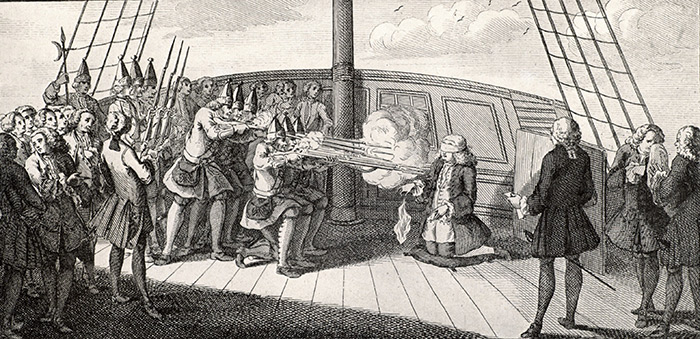This month in history: the execution of Admiral John Byng
‘To the perpetual Disgrace of PUBLICK JUSTICE’ – Byng’s epitaph

On 14 March 1757, British Admiral John Byng was the first and last admiral to be sentenced to death, executed by firing squad at Portsmouth. But why such an extreme response by the British government?
Who was Admiral Byng?
Born in 1704, in Bedfordshire, Byng joined the Navy age just 13 years. He went on to spend 30 years as a naval officer, gaining much respect. He was promoted to rear-admiral and then vice-admiral in 1747. He had been assigned to a number of postings in the Mediterranean and was also a member of parliament for Rochester in the mid-1700s (Gazette issue 9364).
Into battle
The island of Minorca, a British possession, was threatened by a French naval attack. In 1756, as part of the Seven Years’ War, a fleet under Byng’s command set sail under orders to prevent the French from capturing the British garrison of Fort St Philip (Gazette issue 9580).
From the outset, Byng made it clear that he didn’t have good enough resources for such an endeavour, having just 10 leaking ships and not enough men to man them. He had effectively left prepared for failure.
The battle was fought on 20 May. The French inflicted some damage to the leading ships and were able to retreat undamaged.
Byng decided to set sail back to Gibraltar without relieving the fort, to repair his ships and get extra forces. He explained to the admiralty that it would be a needless waste of manpower to continue to attack before this, because they would not be able to stop the French. On repairing ships, before his fleet could sail, another ship arrived from England with further instructions, relieving Byng of his command. He was taken back to England, where he was placed into custody.
The punishment
Byng was to be tried by court-martial for breach of the 12th Article of War, which had recently been revised to mandate capital punishment for officers who did not ‘do their utmost against the enemy, either in battle or pursuit’. The court acquitted Byng of personal cowardice and disaffection, but concluded that he had ‘failed to do his utmost’.
Nevertheless, King George II was asked to exercise mercy, which William Pitt the elder, prime minister, conveyed to the king that the commons were more inclined towards. The king disagreed, saying that "You have taught me to look for the sense of my people elsewhere than in the House of Commons."
‘The trial of the Honourable Admiral John Byng, at a court martial, as taken by Mr. Charles Fearne, Judge-Advocate of His Majesty's Fleet. Published by order of the Right Honourable the Lords Commissioners of the Admiralty, at the desire of the court-martial. To which are added, a copy of their Lordships' memorial to the King, in relation to the sentence passed upon Admiral Byng; A copy of the King's order in Council for transmitting to their Lordships, a copy of the report of the twelve judges, in relation to the said sentence: and also, A copy of that report. And a copy of a warrant from their Lordships for carrying the said sentence into execution.’
Byng’s execution
On 14 March 1757, despite appeals (2 vice-admirals refused to sign the sentence), Byng was led on to the quarterdeck of his flagship, the Monarch, which was anchored off Spithead, amid mobs chanting “Swing, swing Admiral Byng”. A coffin had already been brought on board inscribed with his date of death. Byng prepared himself for death with bravery, resignation and remarkable composure. 6 marines fired and Byng fell to his side.
Why so harsh?
The British government may have sought a scapegoat in the admiralty, having badly underestimated the threat by the French and denied Byng the reinforcements he had requested. It was supposed to send a message to future naval officers that a refusal to fight faced severe consequences.
As the philosopher Voltaire, witness at the execution, aptly put it in his (then scandalous) novella Candide, 'In this country, it is good to kill an admiral from time to time, in order to encourage the others.'
